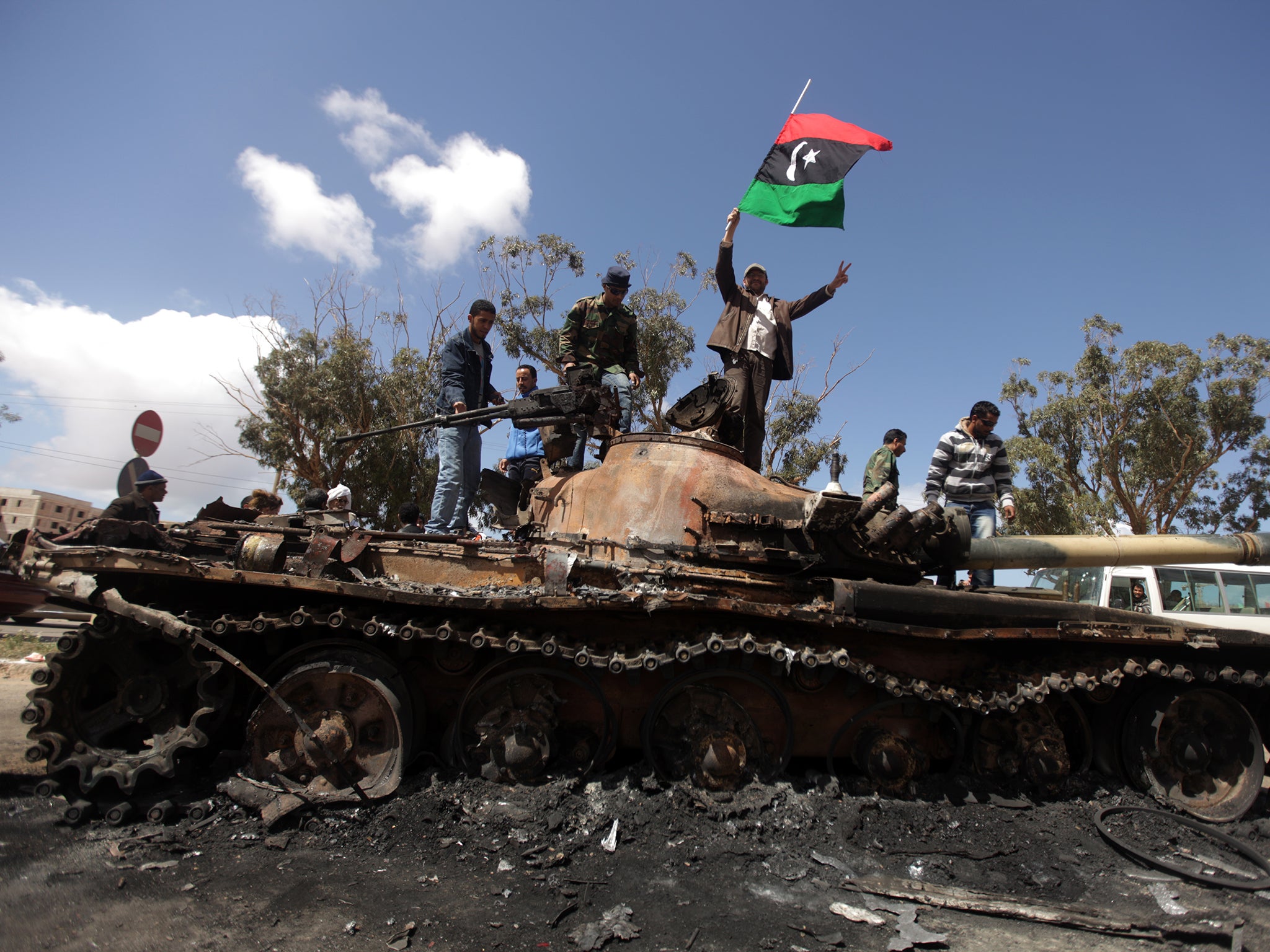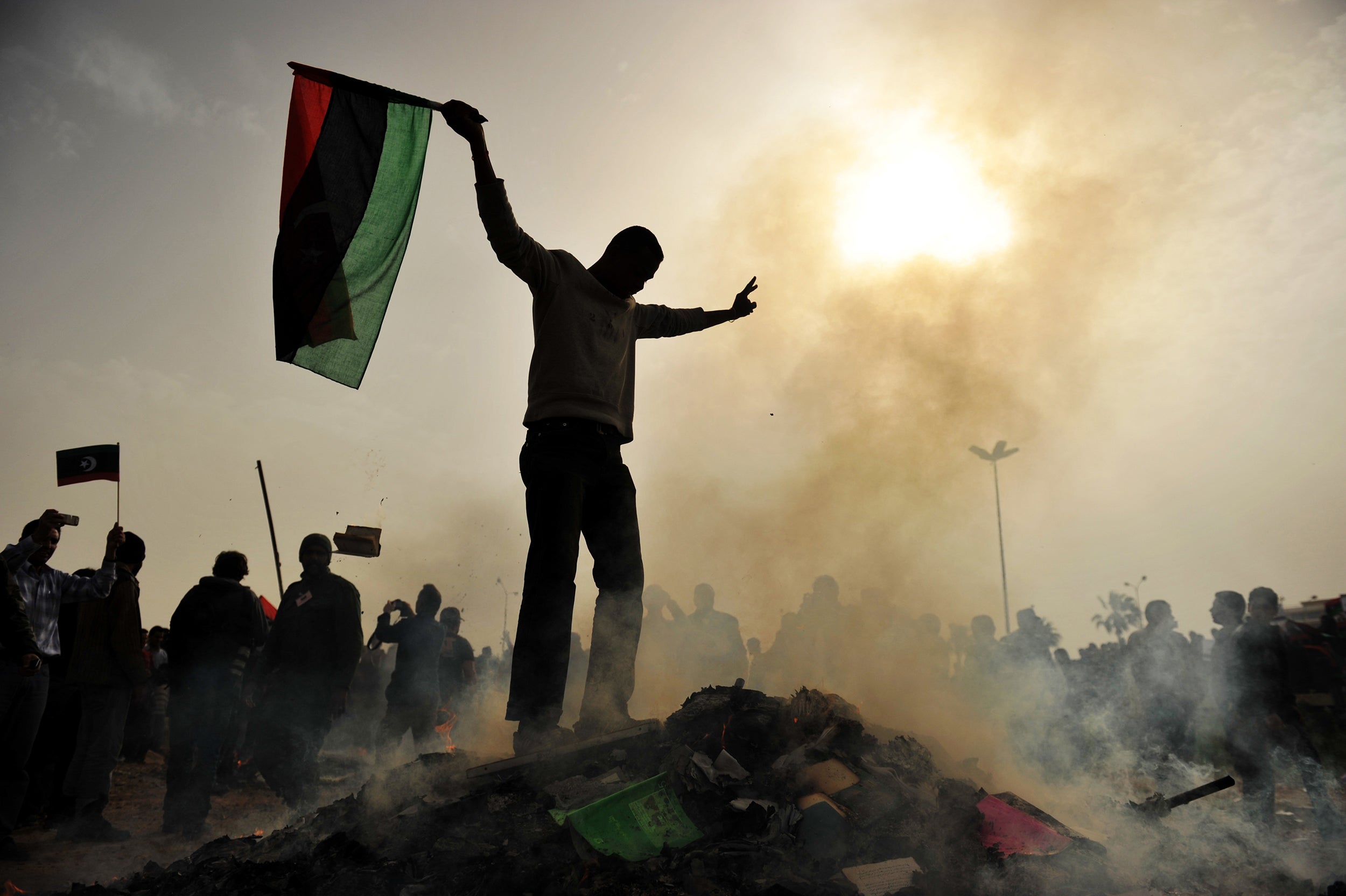Libya: How I watched from the ground as a British PM with no plan led a country into anarchy
Kim Sengupta was in Beghazi in 2011 when the rebel-held city looked on the brink of falling to Gaddafi’s forces, days before British and French planes began bombing. Now, as a scathing Commons report comes out detailing David Cameron’s lack of preparation, he charts Libya’s transition to chaos and infighting after the intervention

Muammar Gaddafi’s tanks were rolling into Benghazi, past shattered homes and charred cars. The widespread fear was of the retribution to come against those who had supported the revolution. Some had managed to escape but many were trapped, expecting the worst.
There had been plenty of rallies and speeches about liberty and democracy in the capital of “Free Libya” in the heady early days of the uprising: but little preparation for defence. There was almost a wishful belief that sheer fervour and justness of the cause would win the day. There was also strong nationalist sentiment: “No foreign intervention, Libyans can do it alone” was the message of a poster much seen in the city, highlighting uneasiness about what had happened in Afghanistan and Iraq.
We had been with the rebel fighters on the coastal road supposedly on their triumphant charge to Tripoli. But lightly-armed and untrained, they were no match even for the ageing armour and artillery of the regime and had fallen back fast, fatalism replacing the ebullient confidence felt before.
There was initial resistance in Benghazi, the rebels carrying out ambushes out of the alleyways, inflicting some damage, but they were finally outgunned and exhausted.We came across a tank burning on a flyover, a crowd around it cheering, but also anxious, looking over their shoulders. “Call the British, call the French, call the Americans. Don’t they know what Gaddafi will do to us, our families?” an elderly man cried, waving his hand in the direction of the regime troops, just a few hundred yards away. Mashala, my translator and friend, who had several brothers in the resistance, put it more simply. “He will kill us all,” he said.
Gaddafi could, perhaps, have taken Benghazi at the time. He had a much larger force for the attack than the one laying siege to Misrata in the west and the rebels there were better armed and prepared. But the regime commanders chose, instead to withdraw and set themselves up outside the city. It was a fatal mistake.

The bombing began very late that Saturday, saving Benghazi and altering the course of the war. We saw the effect the next morning, a terrible scene of desolation laid out on a field edged with wild flowers. The regime’s forces had been caught; vulnerable, in the open. What lay before us was a ghastly miniature of the carnage on the road to Basra when American and British warplanes bombed Iraqi forces retreating from Kuwait.
The tide of the war had turned against the Gaddafi regime with daily bombing by the French and the British, although it was the French who tended to get more credit on the ground, the strikes, for a while, becoming known as “Sarkozies”. But it would take months for Tripoli to fall. In that time I went to Misrata on a ludicrous journey on a boat carrying food and medicine and, unbeknown to us when we started, guns, which ended with the Misrata rebels opening fire on us, injuring a couple of people, because their Benghazi comrades had failed to tell them of our arrival.
The main event, however, was the journey up the coast, back to Ajdabaya and Brega, Ras Lanuf and on the road to Sirte, Gadaffi’s birthplace, with the rebels. More often than not this involved advancing in a convoy, followed by rapid retreat as Gaddafi’s artillery opened up. The regime’s military had a third-world force with antiquated anti-aircraft defences facing first-world air-strikes. But, they were proving to be a far tougher nut to crack than expected.
Tripoli fell in August, Sarkozy and Cameron came to Libya’s capital on 11 September, a visit brought forward to pre-empt a planned trip by Recep Tayyip Erdogan. The Turkish Prime Minister was positioning himself as the leader of the Islamic world. He had already criticised France and Britain for, he charged, trying to take credit for what had been a Nato mission.
The British Prime Minister and French President were given a resounding welcome. The British team had arrived on a C-130 military transport plane; the French party, much larger with a contingent of riot police, came in a civilian airliner. The cavalcade which swept into town on streets cleared of traffic was a mix of governmental limousines and gun-mounted trucks, with revolutionary fighters, waving Kalashnikovs, on board. These fighters would be among those carving up territory as Libya later slid onto the jagged edge of anarchy. The day before, Nato had carried out 123 sorties over the country, Gaddafi himself was still nowhere to be found.
Even if Gaddafi was captured and killed, what was the plan for the aftermath? This was a question asked at the National Security Council meetings in London by senior British commanders. David Cameron was annoyed that his victory was being soured. After the disquiet of the military had been aired in the media, the Prime Minister declared: “This is what I tell them; you do the fighting, I’ll do the talking.”
Gaddafi was caught and lynched in Sirte in October 2011. We saw his body, along with his son Mutassim laid out on the floor of a meat warehouse in Misrata. The Western powers appear to have decided that this was mission accomplished. There was no appetite to attempt nation building after the hard-earned lessons of Iraq and Afghanistan. There was no plan to build infrastructure or provide security – Libya split into warring factions.
Two years later Downing Street decided that Britain would help build a new Libyan army and bring in recruits from the country for training. I recall being at a meeting when a senior military officer said that this was fine in principle, but why not do the training in north Africa or the Middle East? Imagine the fuss if some of the recruits went AWOL and claimed asylum, it was pointed out. “No, the PM wants it done in this country,” stressed a very senior No 10 advisor, “and what he wants he gets.”
The programme got under way in 2014 with the aim to train up 2,000 soldiers. It was short-lived, cancelled after five months following major disciplinary problems and the charging of five of the recruits with sexual offences: another inglorious episode in Britain’s involvement in Libya.
Join our commenting forum
Join thought-provoking conversations, follow other Independent readers and see their replies
Comments